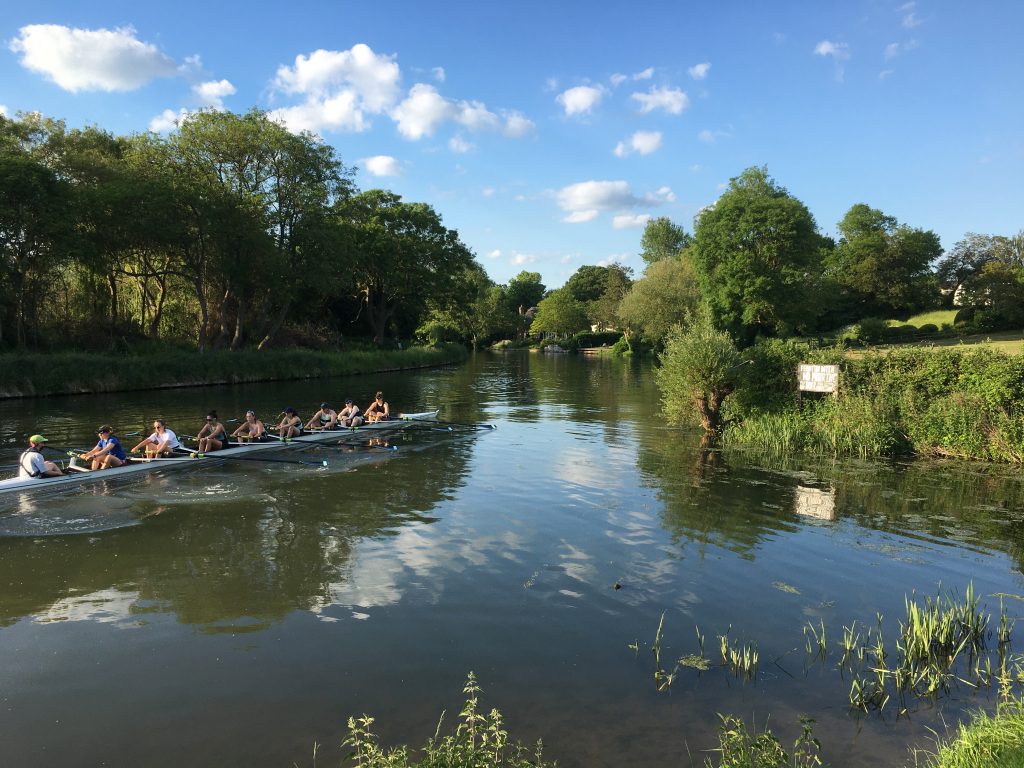
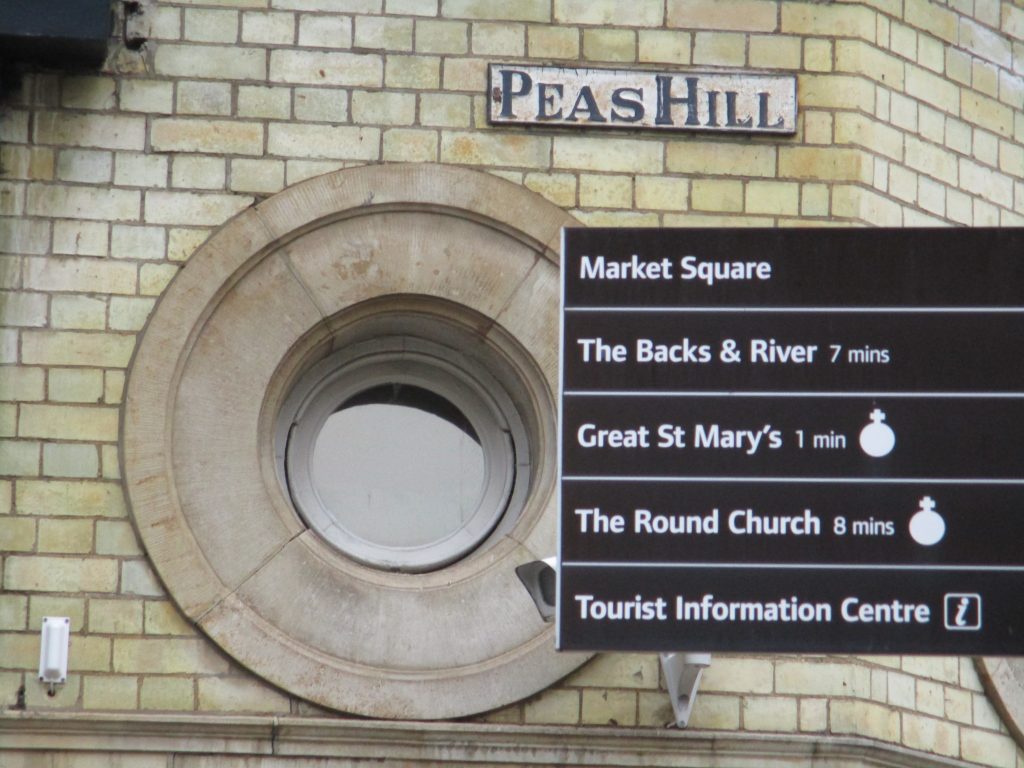
My connection with Cambridge goes back a long time and over many years I have written a variety of poems inspired by this renowned university city.
This latest section may be less engaging to younger readers.
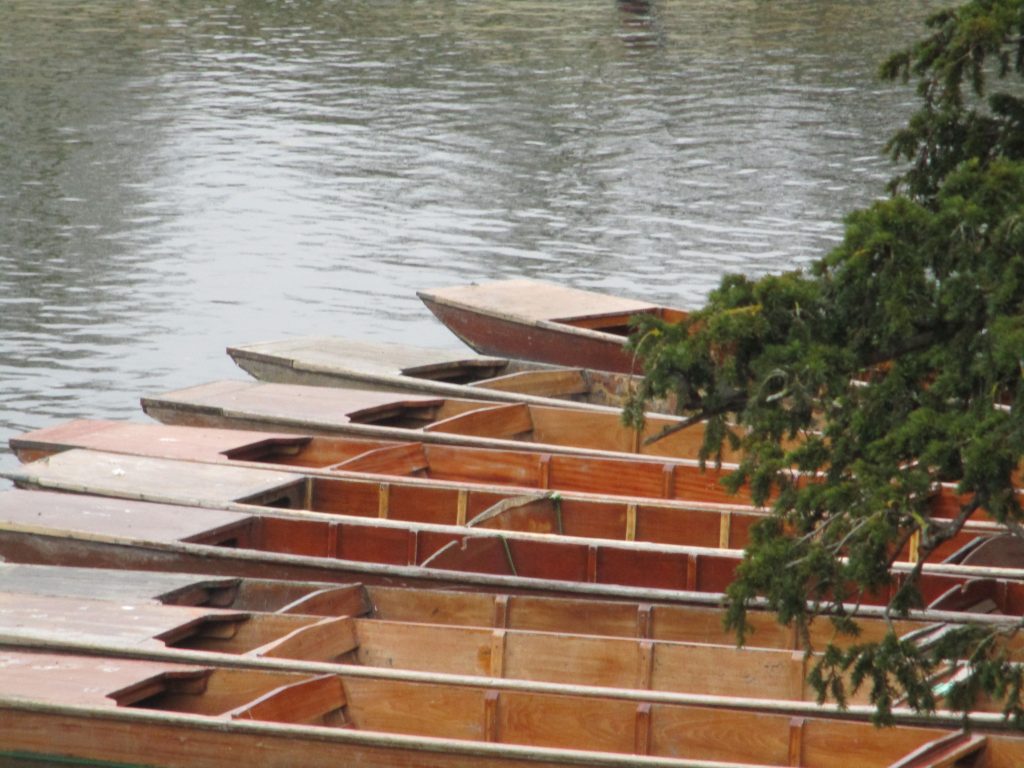
ON THE RIVER CAM
A queue, like
the water, clings close to the river-bank,
Hoping for punts with the sun beating down,
The world and its faces, the town and the gown,
All waiting and waiting for pole and for plank.
Shattered reflections vibrate round the wedged vessels,
Spangles of sunlight cascade from the poles;
The punters, superior, proud in their roles,
Pounding the river with punt poles like pestles.
Theatrical
contrast of shade and the sun’s hot light,
Fairy-tale caves beneath emerald drapes
Where bodies are dappled with camouflage shapes;
The gloom under bridges, the stone mellow white.
Squeals in
the melee, novitiate floaters
Bumping their neighbours, unable to steer;
Occasional plungers, perhaps on the beer,
Amusing the chauffeurs aloof in their boaters.
A girl
spreads a picnic unstable on spongy grass,
Long cotton dress stirring slightly from breeze,
She reclines with a partner under the trees,
Glimpsing the scene as the long moments pass.
Somnolent passengers cruise as the sun slips down,
Rocked by the rhythms of ripple and flux,
Sipping Champagne as they glide by the ducks,
On the satin-draped river that laps at the town.
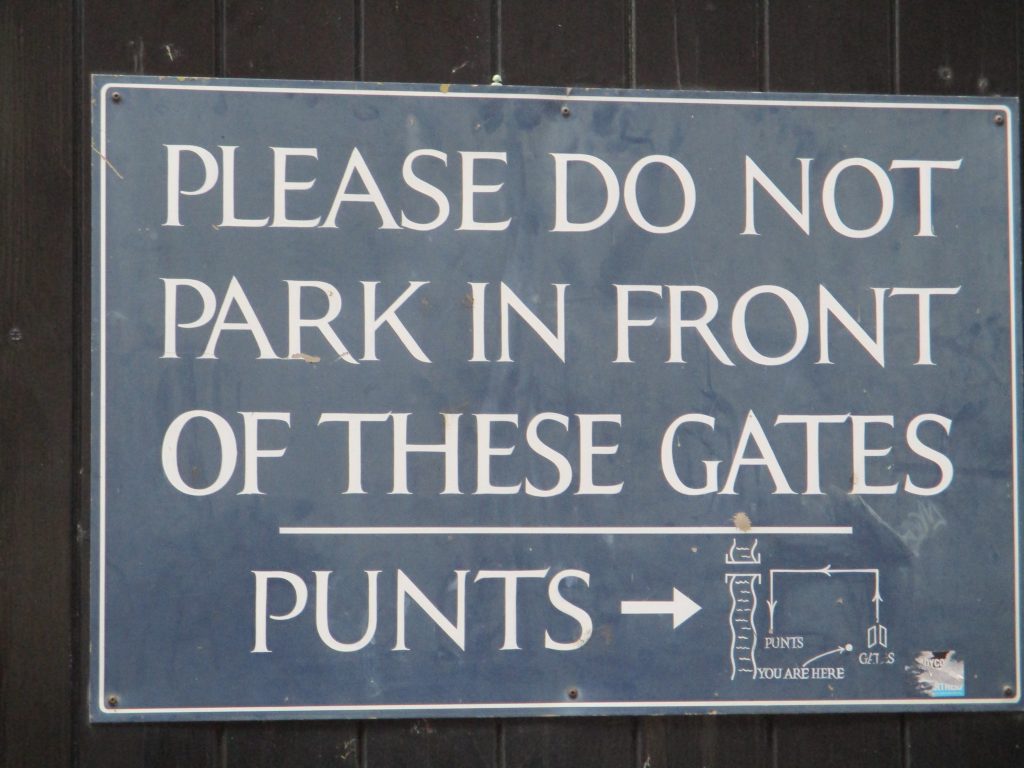
THE OLD BOOKSELLER
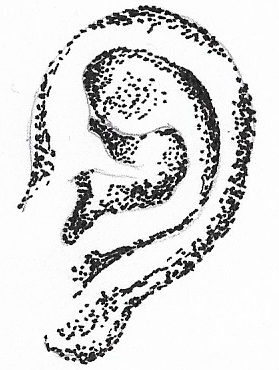
Listen to this
His own enchanted life he’d found
Inside the volumes leather-bound,
Between the shelves of paperbacks,
Amongst the piles and the stacks
Of books that languished there.
The world he travelled, through those pages,
Lost himself in ancient ages,
Sitting in a chair.
From postal sales he earned a crust,
And dons and students (only just),
Observing browsers with suspicion,
Who sensed the strength of his volition
And sometimes fled his stare.
He made his home in dark and dusty,
Comforted by stale and musty,
Thrived on fusty air.
He’s not there now. They’re frothing coffee
Where he sometimes munched a toffee,
Sippers scrolling smart phone pages
As he used to stride through ages
Left behind in ink.
But those old books that found new homes
Keep his trace amidst their bones,
And urge new minds to think.
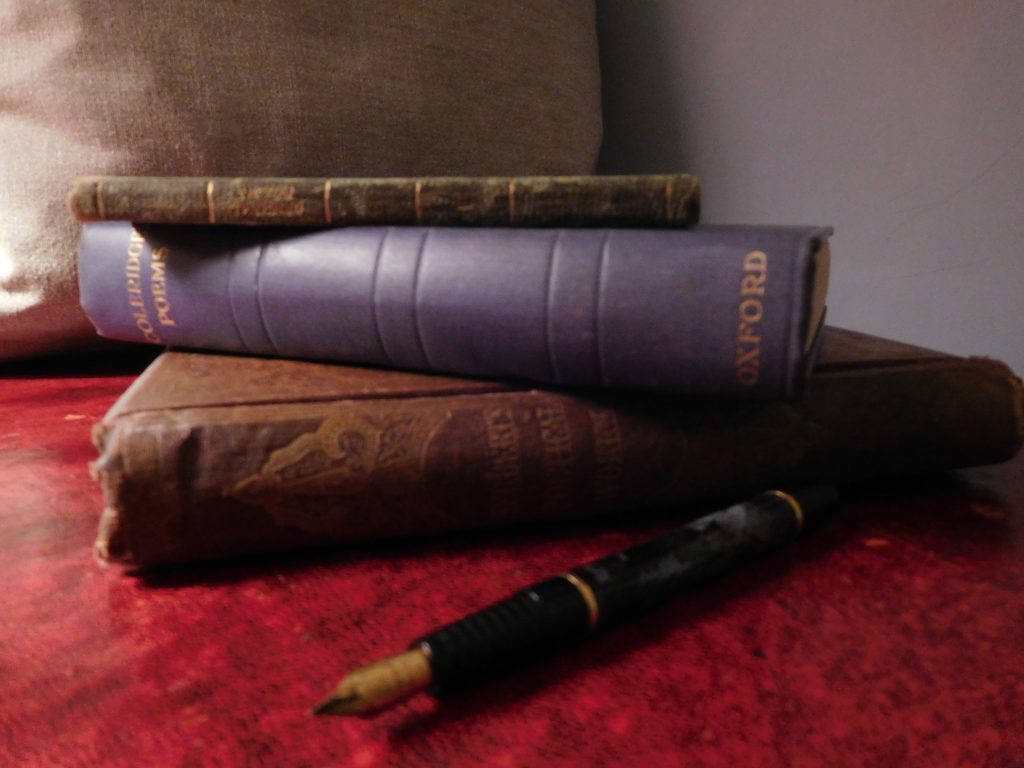
PASSING THOUGHTS
The best is not the golden academic edifices
Prodding the lazy sky,
Or the clamour of the bumping punts
Swishing, bobbing and dripping along the river;
Nor having tea in Grantchester
Underneath the dapple of the apple trees
With Rupert Brooke’s ghost.
It is the sweet-smelling rucked turf
Of the deeply green fen,
Visited by hovering mists in the hushed early morning,
The shimmer and whisper of willow drapes
Over peaceful pools;
And the knowing that the gritty, grimy pavement stones I tread
Have been trod by the feet
Of some of the greatest minds.
Squabbles between the town and the university (the gown) have been going on for centuries. During the year of the Peasants’ Revolt in 1381 the townspeople attacked the University, with crowds forcing their way into great Saint Mary’s Church and breaking open the University Chest.
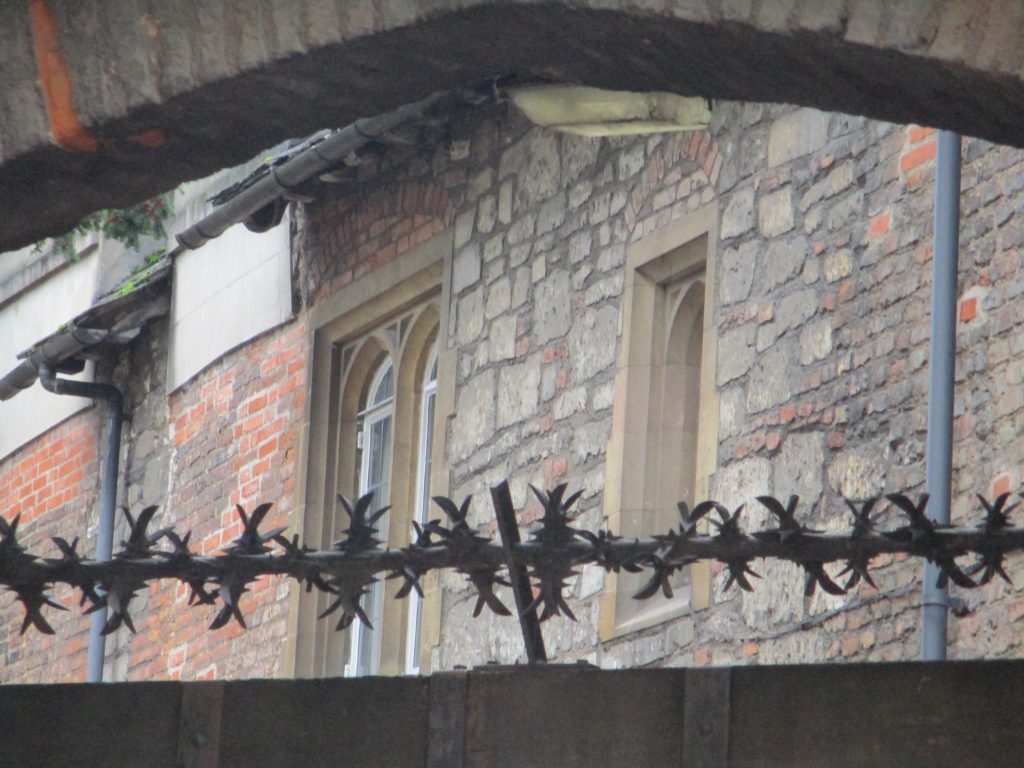
TOWN AND GOWN
The leaves twirl down,
The student’s gown
Is rippling in the breeze:
The local bloke
Thinks it’s a joke –
The gown is all he sees.
By summer sun
Pursuit of fun
Becomes the students’ perk;
The local’s glance
May see them prance
But never sees them work.
Regaled in fur
The proud confer –
By Senate House they queue;
They block the street
With polished feet
And dominate the view.
While concrete soars
And traffic roars
Where city streets have grown,
A gentler pace
Still calms each place
Encased and carved in stone.
In certain pubs
One never rubs
A shoulder with a student:
A college bar is not as far
And very much more prudent.
How might we shift
This ancient rift
And, if we set about it,
It’s been so long
That, right or wrong,
What would we do without it?
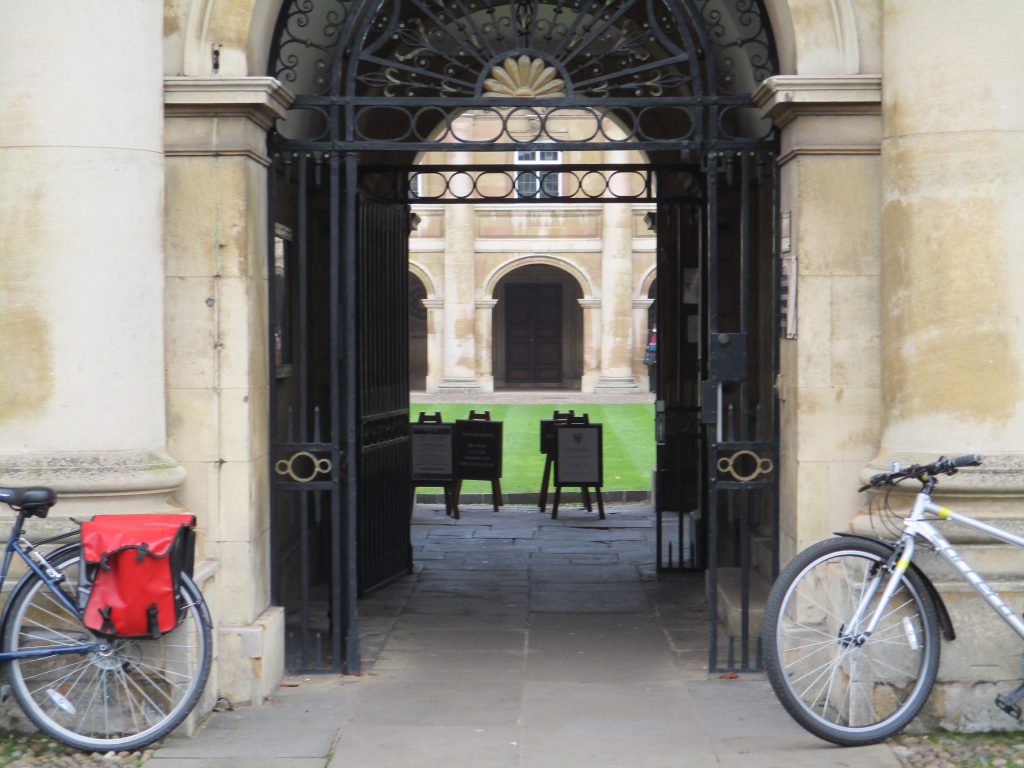
CLOISTERS

Listen to this
The bell tolls
For the living and the dead,
For all the feet that trod these stones
And strode towards
A wider world.
The walls echo
An organ’s boom
And soon a choir’s melodies
May carry souls towards the sky.
There have been times
When scant substance settled here,
When largely little, narrow minds
Perhaps were swelled by drink,
But scarcely thought of more,
Pottering pointlessly about
Amongst these mellow edifices.
It’s more important now.
The long gone, gowned monks
Still hang in the shadows,
Their zeal firing the sunsets that burn between the columns.
And the peace of times not mechanically driven
Settles back
Like a comforting cloak.
Quadrangles, cloisters, courts and streams
Permit true thought.
This is where we learn from the past.
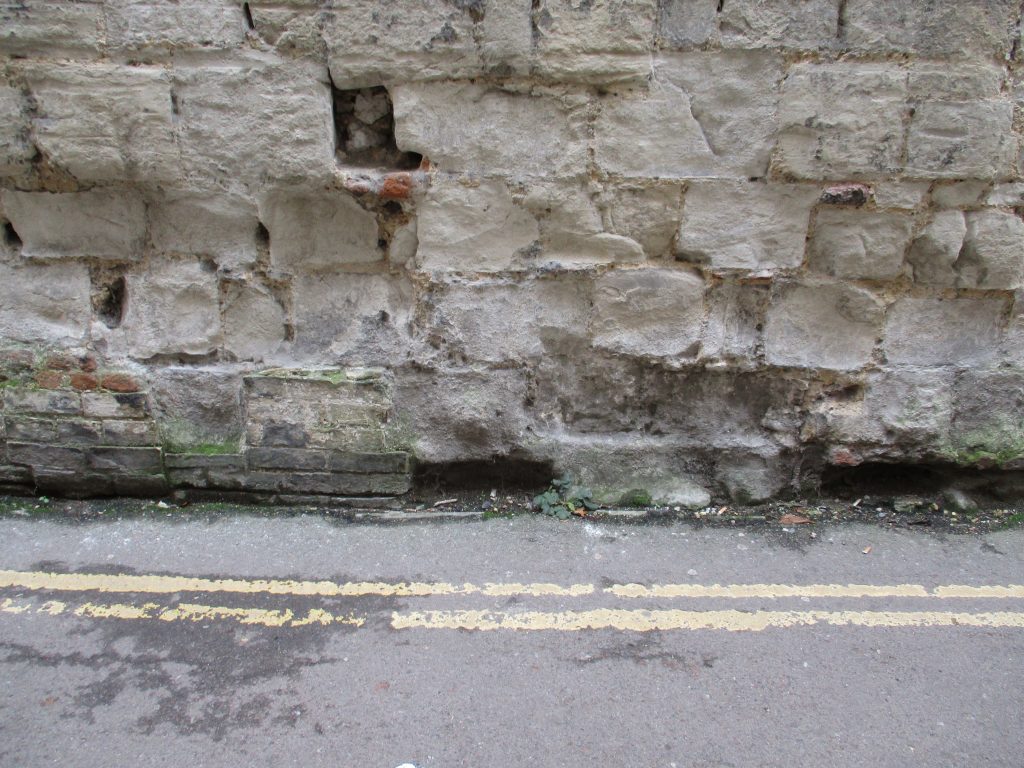
CANTABRIGIAN COLLEGES
Their windows peer,
with frames of stone,
From lofty heights above;
Monuments to all that’s known,
And academic love.
They nourish
intellects supreme,
And those who fortune brings,
And poets, who have dared to dream
Of even greater things.
With sacred gardens
all but hid
From local people’s gaze,
That learned dons may muse amid
Ethereal displays.
Where courts and
cloisters close around
A famous name may pass,
And feet may tread on hallowed ground –
But not walk on the grass.
Polished floors and
paneled walls
For grandiosity,
And diners watched in dining halls
By eyes that cannot see.
By narrow stairs,
through grubby doors,
The little rooms reside
Where students sleep and do the chores
Demanded by their pride.
For every chapel there’s a bar,
For every book, a beer;
For every fine façade there are
The dustbins at the rear.
UP-AND-COMING AREA
Where will Edna wander when her street’s a shopping
centre
And her cake shop is a deli serving brunch?
How will she adjust to every Tom, Dick and Dissenter
Railing their opinions over lunch?
Who will be a neighbour when she wants a good old
natter
And she wonders which detergent to prefer;
When café society flits about with flounce and chatter
Who will ever stop to talk to her?
Could she feel familiar with a street renamed Designer
As its perfume and espresso round her wafts;
Where will be her home with every terrace strangely finer
And all spare space converted into lofts?
Where she bought bananas may be offering an etching;
Where she got her string, a smart antique.
The latest Lines and Labels may not be her brand of fetching;
How could Edna suddenly be chic?
But in her time she’s seen so many changes come and
go,
And never was the sort to hide away;
Though she may seem a stranger to a word that others know
She’ll sip a Cappuccino while she may.
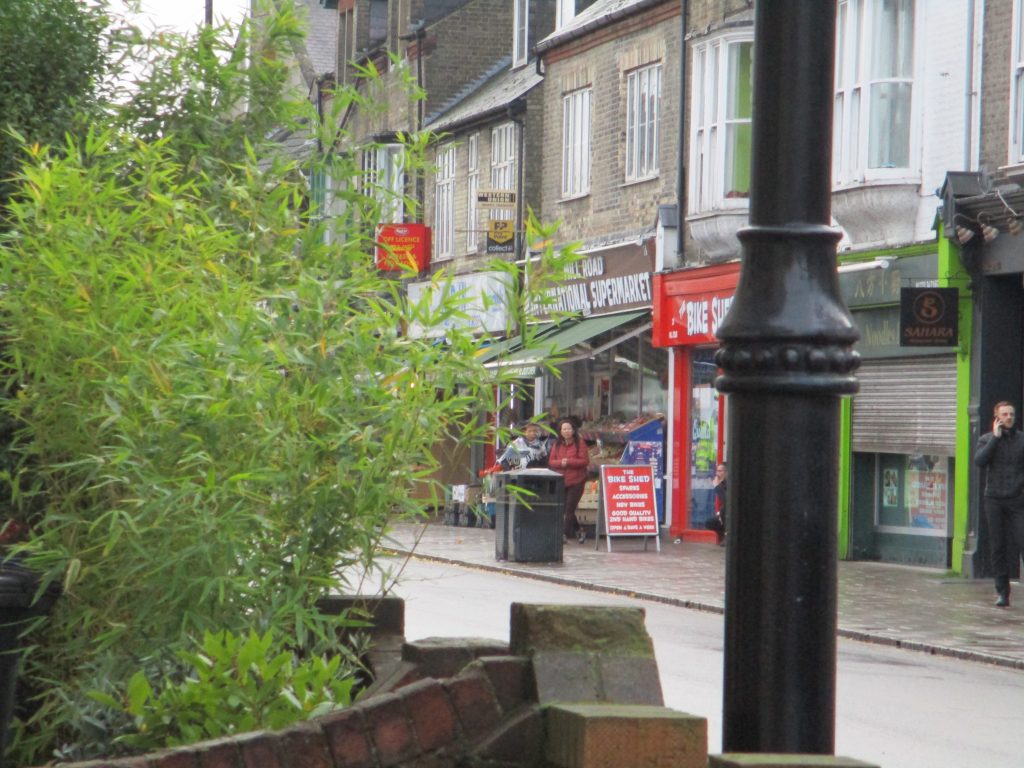
STUDENTS CYCLING HOME

Listen to this
Did Trinity bells chime
The drowsy hours;
The edifying towers
Telling us the time?
I know we heard the rasp
Of cycle wheel,
And shrank to feel
The night-time’s chilly grasp.
Past the Lion Yard,
Where shadows crept
And trysts were kept;
And on we peddled, hard,
Past the bolted doors;
The passage lanes;
The shuttered panes
Of dark, deserted stores.
And whirring, purring still
The dynamo.*
Then pounding slow,
We climbed the nuisance hill.
How silence changed the street:
We sensed the air,
Were so aware
Of any nearby feet.
Then, with break-blocks squeaking,
Home, to find
The windows blind,
The emptiness of sleeping.
The clock alone was there
To meekly state
That it was late,
And couldn’t make us care.
*Dynamo here refers to an old style of bicycle light that used to be common. It was powered by the pedaling of the bike itself but had the disadvantage of not being lit when the cyclist was not moving.
COLLEGE LIVING:
when a home is not a castle
We lived among some pots and pans
Grown grey with age at others’ hands;
Our morning eyes saw drowning mugs,
Our night-time blear, encrusted plugs;
And where the weedy garden grew
We dozed, with better things to do.
We found our beds in mounds of paper,
Losing something vital later;
Sought some rest on saggy chairs,
Bemoaning our concocted cares.
We watched our lives and viewed our past
Through emerald-coloured bottle glass,
Through murky mirrors, dingy panes,
And by significant remains.
You couldn’t say we lived like kings –
We had our minds on other things.
CAMBRIDGE WILL-O-THE WISPS
A hundred thousand loud and gentle voices
Rise above the murky veils of diesel fumes
And peel in a sky deep ocean blue.
Within the tessellated view
Mercantile colours shout of choices,
Seen from steel cliffs and apex attic rooms
Where air and height and space permit the drifting
Of the waiting and the shifting.
Sun-touched windows shriek before the eyes,
Their stellar flashes searing through the dusky trees,
Making urban will-o-the-wisps.
There is a pause within the city rise,
There’s peace beneath the rolling concrete seas
And life that breathes.
GARRETT HOSTEL BRIDGE
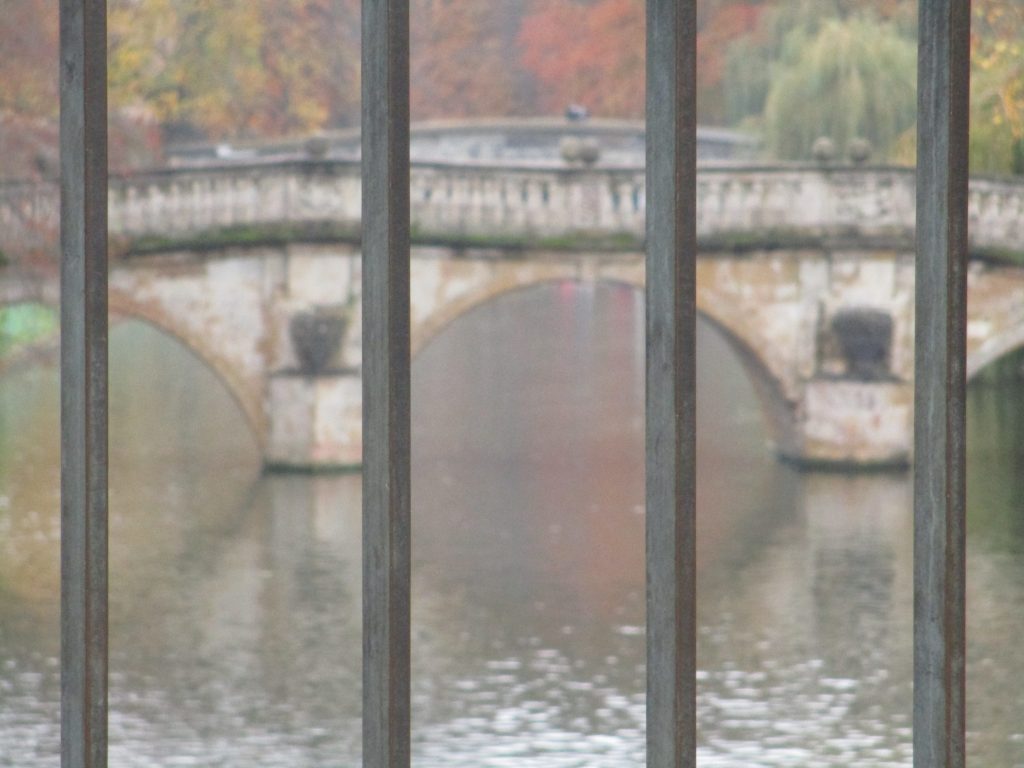
The bridge, a very public thoroughfare,
Grips the cyclist’s calves and rump,
Rises like a monster’s hump,
And rears above the fans of punts,
Peering at the slightly dislocated ribs
Of Clare Bridge.
Singing in the nearby cloister
Rings beneath its rails and mortar,
Laughter ripples on the water,
Teasing the almost virgin verges
Green as limes.
Proud it stands amongst the beauty,
Functional in public duty;
Drives through scenes from books and movies,
Where the secret lives of worshipped minds
Go leaping on.
YOUTH DOZING IN SUMMER
You’re nutmeg brown and smell as sweet as grass,
And grass is where you lie and where you dream,
And where you find that you are in the sky,
Yet in the stream
Of all the things that pass.
Your eyes are glowing like the beer you drink,
Hands searching for your love, for life to grow;
Of splintered times before you and above,
You need not know.
You need not even think.
TAKE A WALK:
in my town
Take some steps with me
Amongst the loyal shadows
And the constant walls;
Regarded and engendered by the watching windows –
For we see ourselves in these.
Bend your feet to cobble stones
And circumvent the chilling railing iron
With one firm hand.
Such things were built for others,
But with us they meet
And we will pass them by
And pass them on
To other hearts and other pairs of feet.
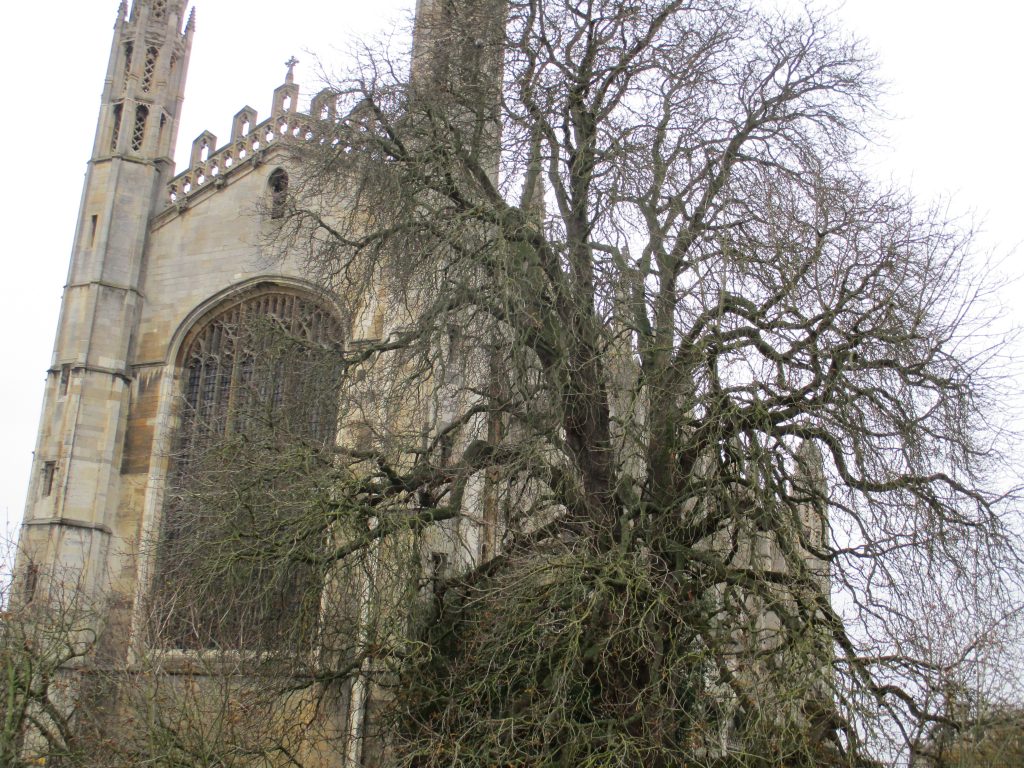
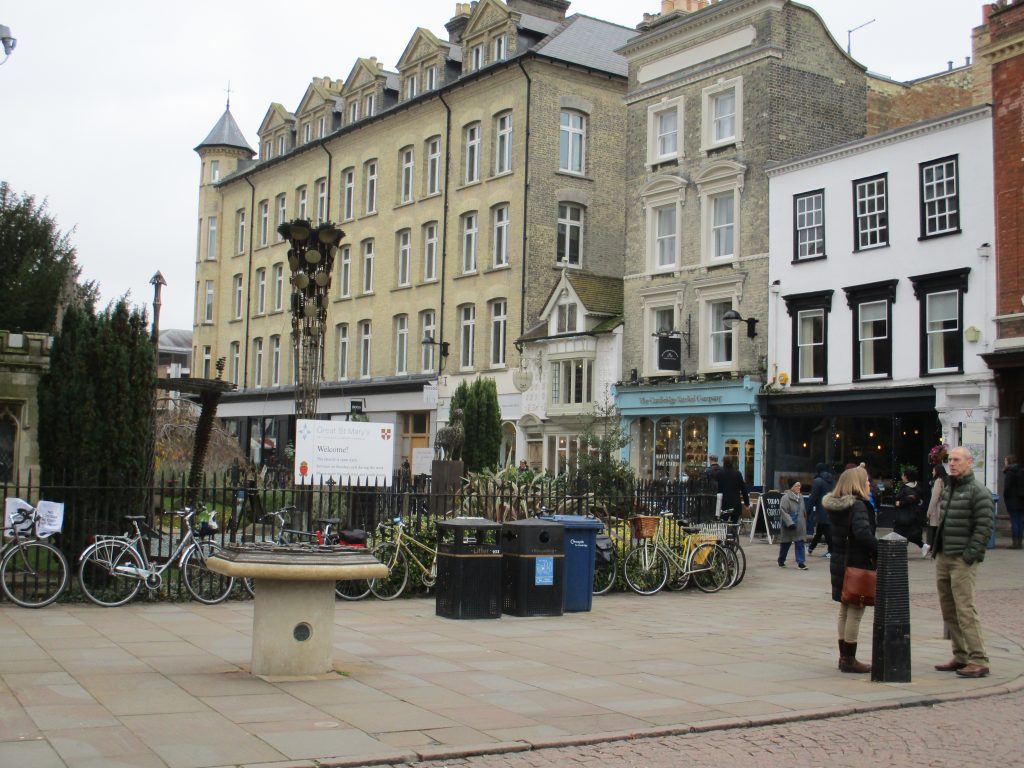
KING’S PARADE
Those who have a place and a profession,
Those who, for the good of Man, about their research go,
Those who write the popular imagination
Understand the things they need to know.
I can only stare at this pale stone still as death,
I can only watch as the tourists suck it into film,
I can only walk foot after foot, breath after breath,
Without direction, without a rudder or a helm.
I am not a stranger, but I feel it.
I am not a taker, but I steal it –
This place and time –
And try to make it mine.

UP AT CAMBRIDGE
Deliberative and argumentative they may be;
Seen in faded clothes
Chosen for their lack of fit,
As symbols of their unrestrained intelligence and style.
Seen in country tweeds,
Seen in Ede and Ravenscroft*
Or in the Eagle.*
A fragile rose with studded nose,
A brooding frown enrobed in gown,
Oddity and beauty, prodigality and duty,
Despised and desired, enraptured and tired,
Imaginative and demonstrative they may be;
Wanted for their flair;
The chosen ones,
Nurtured, swelled for public use,
Wanted for their minds,
Wanted for their strident voices,
And by their lovers.
*Ede and Ravenscroft is a famous tailors/outfitters supplying all kinds of University regalia, college ties etc. The photograph above shows a wonderful display of college ties in the window of the shop, which I snapped in 2019.
*The Eagle public house is famously where Francis Crick announced that he and James Watson had discovered the structure of DNA. It has long been frequented by University staff and students. It has been operating as a pub since the late 1660s.
OUT FOR DINNER,
Cambridge 1999.
What’s more delicious than a warm September night?
And by a window poised,
Where waves of milky light
Illuminate some perfect curve of moulded stone,
A balustrade, a regimental line;
Some stillness out. Inside, the glint of wine,
The lap of water poured,
The back and forwards feet of waiting staff, the rasp
Of wooden chairs on floors
Barn bare
And able just to grasp
The sounds of education and of foreign words.
There, stepping by, the faces of the globe;
A cat-walk suit, a linen shape, a robe,
A grizzled jaw alone.
The fork, the knife, the salad and the sauce-skinned
plate,
The us and them of nook
And street; of now and wait.
And what it means to be here and to pay the bill.
How kind of us to leave an extra tip,
How right to praise the chef, and then to slip
With smugness to reality.
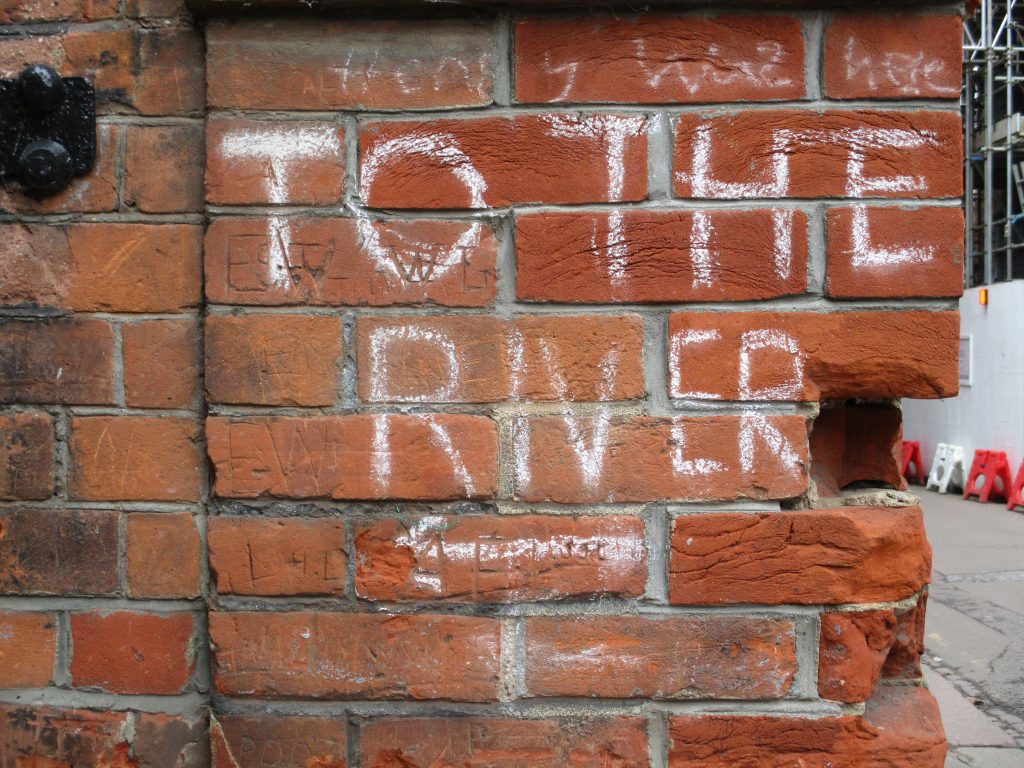
UNIVERSITY GARDENS, Part I
The early sun soared on flamingo wings,
And the sky turned bluer
Than it had a right to be.
Free on Winter Fridays, the Botanic Gardens
Were remembered as a peaceful place;
Serious botanists, paying tourists
And mums with wellingtoned disciples
Shunned the clogged streets.
The light winked through the patient trees,
Elephantine, chalky, exotic and strong,
And the elegant limbs of the firs
Reclined in the drowsiness of the stilted season.
Discaria toumatu, Arbutus unedo –
Incantational christenings,
Toumatu, Toumatu.
There were imperious preening ducks,
Calm on the snaking pond;
Haplopappus, Haplopappus,
Haplopappus coronopifolius colluding down low
With a mud-grazed lime tennis ball.
A papery bug danced on my arm,
And a left gardener’s cart seemed hanging time.
The winter-dead beds
Were flat, except for the loyal botanical labels,
Like a war cemetery.
But the dead introduced themselves
Through the benches “In Memory”.
Myrtus luma, luma –
Leopard orange stems so strange,
But compliant in this laden fantasy,
Where so much that ought to have been dead
Lived ecstatically and unreally.
I was a lizard,
Darting to a sunny hothouse perch
In a few square feet of jungle, lavishly warm.
Volumes of jasmine
And coloured trumpets blew heaven’s scent.
Someone had dreamed of science
And paradise.
A gentleman scholar once took books
From a long-empty cupboard on a flaking wall;
And I took mindless peace.
The imprisoned treasures of the glasshouse
Tickled the restraining frame,
Pressed and pressed the panes.
Some squeezed hungry stems out,
Up towards the trees,
Where they were soon stripped and murdered
By the natural ways.
And down in the dark shade,
In the sticky damp of the black back paths,
Where surprising early flowers warmed
Honest seasonal shivers,
Helleborus foetidus.
Free on Winter Fridays,
Free Haplopapus, free foetidus.
Toumatou, toumatou
To take away into the unwalled world.
Remember the peaceful places.
(The Latin plant names used are as follows:
Discaria toumatou – a thorny shrub native to New Zealand and sometimes called “wild Irishman”. It has small, white flowers in November.
Arbutus is a genus of evergreen shrubs with beautiful red Autumn fruits.
Happlopapus are rock garden plants with daisy-like flowers.
Myrtus luma, or myrtle, is an evergreen shrub with red or black edible fruits that gives off a fragrance when it is brushed against.
Helleborus foetidus, the “stinking hellebore” is an evergreen plant with pale green winter flowers. It is poisonous!)
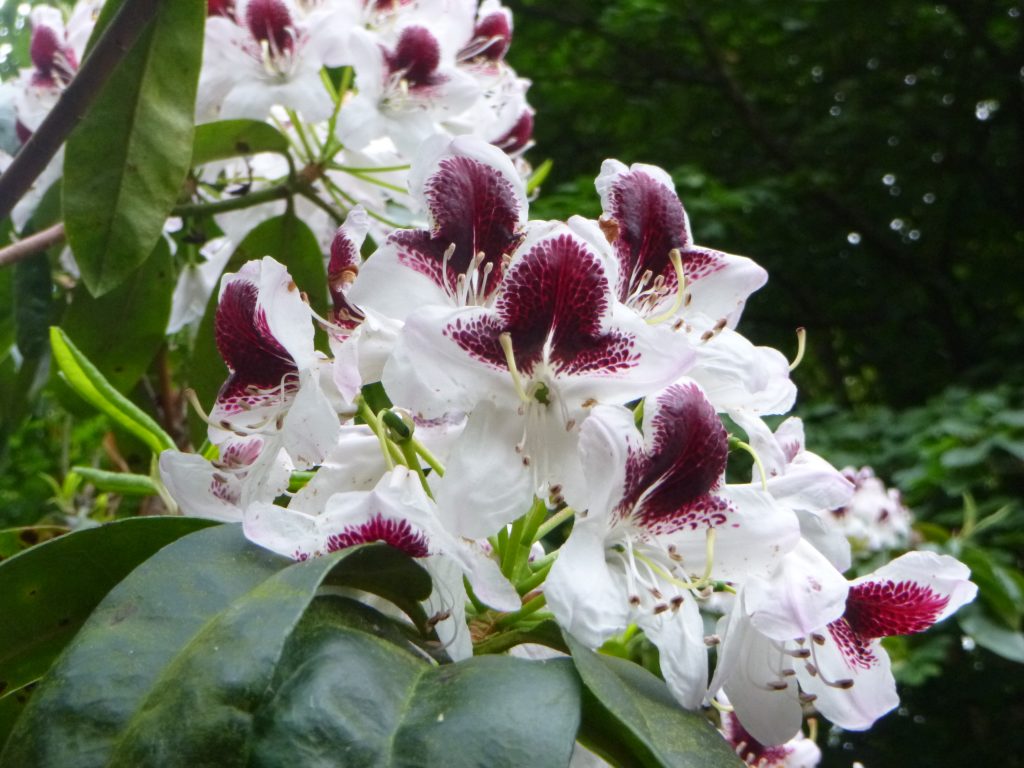
UNIVERSITY GARDENS, Part 2: Creating Lily
She steps serenely from the enclosure of a book,
Glides, in rustling garments, from a period film;
In ivory white, extended by a parasol,
She may loll, with perfectly boned posture,
On a hard, ornate bench,
Metal melted by her flawless femininity.
She is loved, expectedly, by a true gentleman,
Whose ardent respect makes his smothered passion
An absolute pleasure.
She carries a compact volume,
Balanced in a hand gloved
To save her from feeling flesh.
And she saunters in the gardens,
Seeing, in the gloss and the glint of the lush leaves,
The living sparkle in his eyes,
Spotting, in the silky lake, a shape that could be his,
So that the ripples beat in her breast.
The sun always shines
Where Lily glides,
And he is the light of her eyes.
Through the glasshouse she moves,
Stirred by her own breeze.
A fascination forms with cyclamen,
Frail and vigorous both.
The cacti house
Is dry as death and cruel as a sharp word;
But there he is. At her back.
Her little gasp falls
Upon the grains of grit,
And her modest look rests on a crimson flower.
He knew a lot of names:
His botanical Latin made him seem so wise
And worldly.
He meant to be a scientist,
Eager and honest and necessary.
In the hugging of the tropical house
He guides her.
Jewels of perspiration collecting, unavoidably,
Around the rim of his crisp white collar.
In the freshness of our English air,
Beneath a colossal tree,
They took their leave rather hurriedly.
Somewhere she had parted with a companion
And was quite alone.
She felt the unsuitability of studying him
Stride off.
She would never remember those scholarly names,
And would disappoint him.
In the garden they sometimes met,
Sometimes they passed with a respectful nod;
They sometimes avoided meeting,
Though she always knew he was there.
She adored the tumbling freedom of the fountain,
Felt his cultivated vigour
In every stretching tree,
And the infinitesimal touch of his sweet breathing
In the incense of the lilies.
KING’S COLLEGE: Nine Lessons and Carols
Beyond the pulsing surge of Christmas trading,
Beneath the dense December sky,
And as the cheery queue winds by,
The chapel’s halo burns, with daylight fading.
Gilded pipes pitch sound into the street;
From creamy stone a headless crown
And fearsome dragons look on down
At sheepish coughers, coats and shuffling feet.
The velvet hammer of the sacred word,
And soaring heights of solo song
Bring moods of Christmas, rolling on
With every candle seen and carol heard.
The shiny heads of boys in surplice drapes
Are magnified by time and place.
Devotion sates one watching face
Until, by Lesson Six, a yawn escapes.
Heaven trickles down the funneled vaults,
And cultured English taps the ear.
Majestic the mystery honoured here
To lift us from the mire of our faults.
One baby born – amongst the millions hurled,
To die, to live and to inspire,
With dancing glass and dulcet choir,
One glorious building singing to the world.
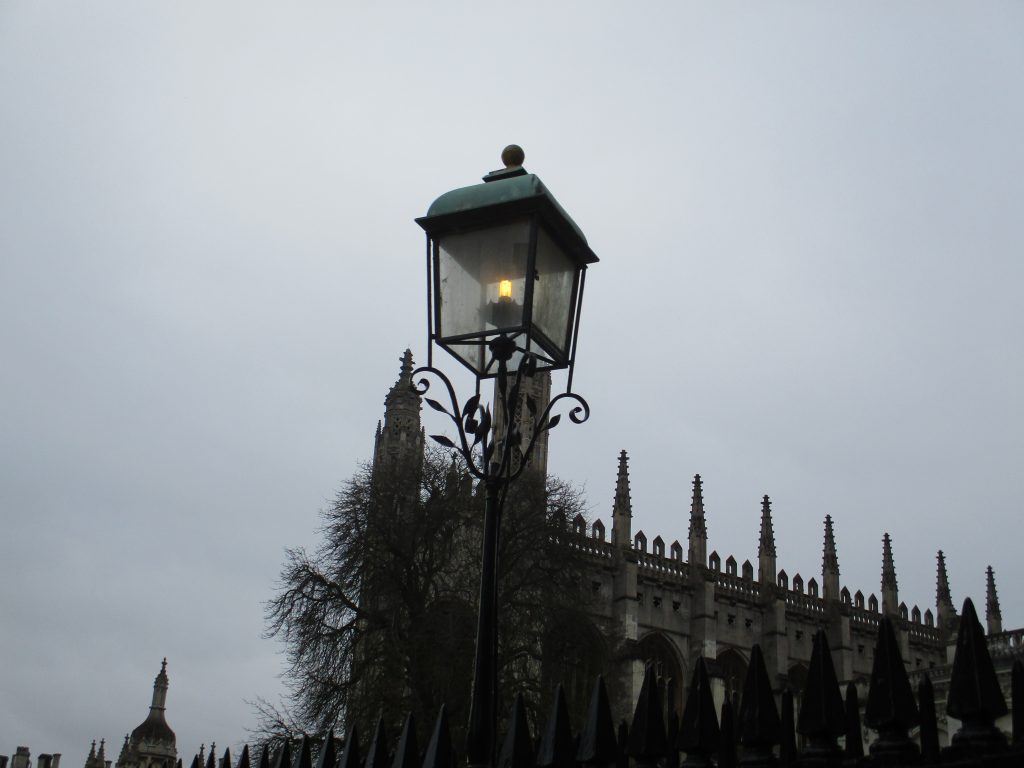
GREAT ST MARY’S TOWER
Thigh by thigh,
Taut anatomy pulled me to the roof;
The surge of unresisted dull pain
Supplanting irritating life.
A heart-beat spiraling towards
Height in a holy place;
Driven by the beat of the strike
Of foot on stone,
Each stone, each block, each rise
A pulling down; and a lifting up.
I trod
Amongst the ghosts of toes,
Of calloused feet,
Of leather-shod,
Of feet worn stony with dark dust.
And then there was wafting, wavering light,
Where birds’ eyes spied;
I saw it all,
Above the screw and scrunch
Of the much too narrow ways.
A little town of big words
Threw its hue and cry
Upon the breeze,
To dart about my head, hard-knocked
Against the planks of fenland air
So strong in the height.
Taking my camera in both hands
I snapped at a moment
In the flattened market,
Keeping the temporary shape
Of fashion’s shops and the names of the day.
Ten years after
This was history.
SOMETHING IN THE DUST

Listen to this
There are places where the visitors don’t walk,
Past time alleys where the vans don’t rasp,
Dark and dusty stairways where the brains don’t talk,
Shining little corners that the snaps don’t grasp.
There are streets that our pride won’t name,
Mud-grained yards where the cats hang out,
Cracked and sinking graveyards where the dead sense shame,
And roadside hulks of cars that are knocked about.
There are swards where the bikes don’t clank,
Glass-wet grass where the gowns don’t flare,
Streams, beyond the stonework, fringed by just the bank,
Shades, glades and hollows like a creature’s lair.
There are towers where the bells don’t ring –
Squat tower blocks for the unknown lives,
Chip shops in the litter and that city thing
Of concrete and graffiti. Maybe needles. Maybe knives.
There are halls where the dons don’t eat,
The passageways where the workers moved
Now lifted up with artworks and sisal for the feet,
Gentrified and opened wide to be improved.
There’s a spot where some chewing gum is spread,
Trod by feet tracking fear or trust;
Legs that speak my language and the ones who never said,
But every toe is someone stirring something in the dust.
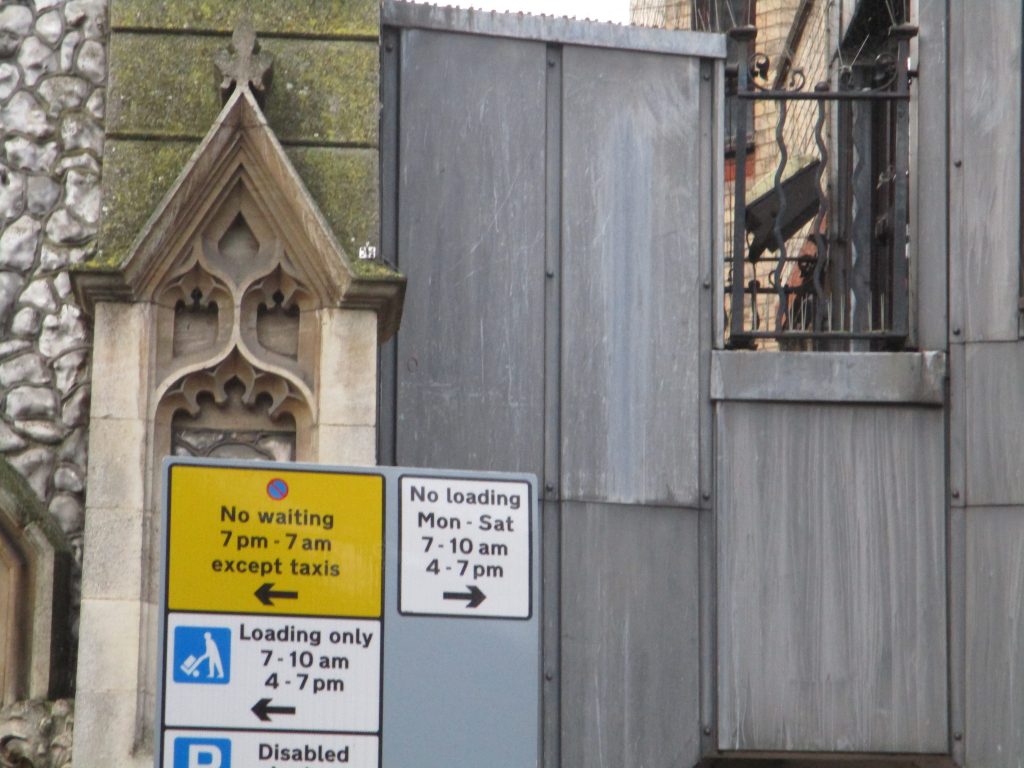
CAMBRIDGE VIEW
A single bell, ringing through the rain,
Summoning the whirring, rasping, burbling traffic
To cessation.
Somewhere on the long horizon lay,
Between the bricks and steel of our times,
The things the tourists came to see;
The desert coloured stones,
The arrow towers jabbing at the murky sky.
Outwards, where the clots of humanity trickled away,
The fields lazed,
The slow turns of farming ways.
Or stretch another finger on a straining road
To feel the race and tug
Of technological endeavour,
Of metal cubes and winking glass.
All eyes are on the Senate House
On graduation days.
Flaring black gowns and flashes of vivid silk
Are all but sorcery in the weird rituals
Of revered and resented tradition.
Pigs and sheep loiter in the streets no more;
Just a grubby blanket, an utterly weary face,
A prone, unknowing dog.
They still graze, the cows, on the old land,
Like ghosts;
Scattered on the stringy tufts of common grass,
Paddling in the swampy puddles,
Bemused by things.
And the river’s almost a quilt today,
The fine and filmy rain edges away
The punters, cavorters, shriekers, clatterers,
Leaving it at rest.
Over the bridges,
Cycle wheels speed in the wet,
Cutting through scenes that painters take to heart
With utter nonchalance.
Central Sainsbury’s drips with limp umbrellas;
Marks and Spencer beats with urgent rhythms
Of time-tortured feet,
Snatching sandwiches and claiming supper-time treats.
Quick, quick, quick.
Slow, slow, slow,
Up the kingly steps of the great museum,
Grey and deathly quiet;
Until, some time, Miss Tompson’s class
Will come to flaunt their sweatshirts
At the empty eyes of hacked about
Roman stone heads.
A business lunch or two
Slips down,
Like the inevitable trace of water on the restaurant’s view –
Suspended in tension here and there,
Then flowing on.
A burger chain and pizza outlet
Shelter day-trippers;
Big ones, small ones, tiny ones,
Filing in like trains of ducks.
There is this little house
Squeezed into a stop-start, in-out, one-way street,
Clocking up the pound signs in its windows.